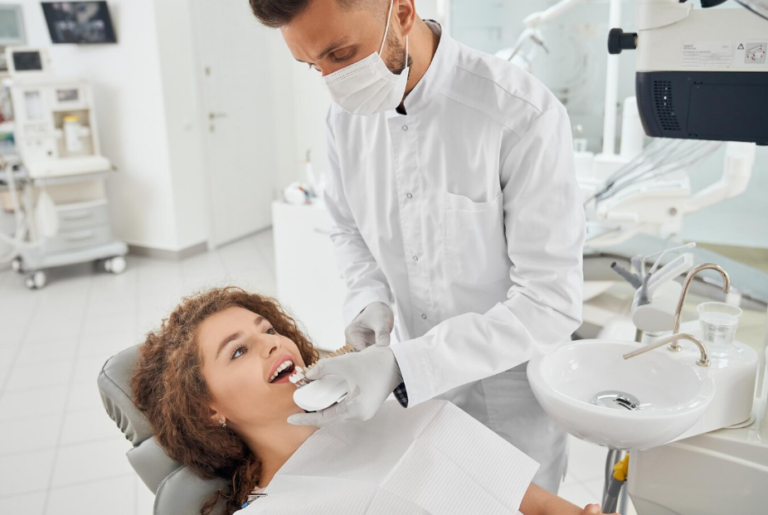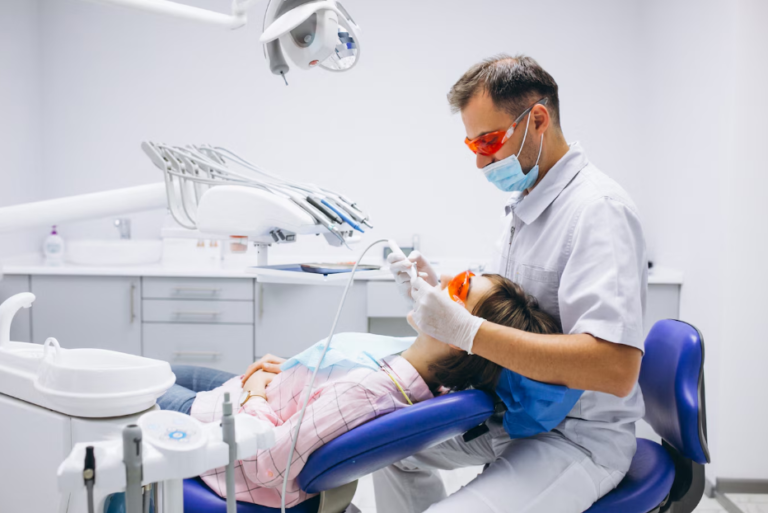Finding the Best Dentist in Plymouth: Your Guide to a Healthier Smile
Finding a good dentist in Plymouth is a big deal for keeping your smile healthy. It’s not just about fixing problems; it’s about making sure your teeth and gums stay in good shape for a long time. This guide will walk you through what to look for, what kind of care is out there, and how to keep your mouth happy between visits. Let’s get started on finding the perfect dental partner for you right here in Plymouth.
Key Takeaways
- Regular check-ups and preventative care are super important for keeping your teeth healthy and catching issues early.
- When picking a dentist in Plymouth, look for someone trusted who cares about patient happiness.
- Plymouth dental offices offer lots of treatments, from making your smile look better to advanced stuff like dental implants.
- Good daily habits, like brushing well and watching what you eat, are key for oral health even when you’re not at the dentist.
- Your mouth’s health is connected to your whole body, so taking care of your teeth helps your overall well-being.
Understanding Comprehensive Dental Care in Plymouth
The Importance of Regular Check-ups for Your Smile
Regular dental check-ups are way more important than most people think. It’s not just about keeping your teeth white; it’s about catching problems early. Think of it like taking your car in for an oil change – you’re preventing bigger issues down the road. These visits allow your dentist to spot things like cavities, gum disease, and even oral cancer in their early stages.
- Early detection of cavities and gum disease.
- Screening for oral cancer.
- Professional cleaning to remove plaque and tartar.
Skipping check-ups can lead to more extensive and expensive treatments later on. It’s a small investment in time and money that can save you a lot of hassle in the long run.
Preventative Care: The Foundation of Oral Health
Preventative care is all about stopping problems before they even start. It includes things like fluoride treatments, sealants, and patient education. It’s like building a strong foundation for a house – if you do it right, everything else will be much easier. Plus, good preventative care can save you money on dental treatments in the long run.
- Fluoride treatments to strengthen enamel.
- Dental sealants to protect against decay.
- Education on proper brushing and flossing techniques.
Addressing Potential Issues Before They Escalate
One of the biggest benefits of seeing your dentist regularly is the ability to catch small problems before they turn into big ones. A tiny cavity can be fixed with a simple filling, but if left untreated, it could lead to a root canal or even tooth extraction. It’s like fixing a leaky faucet before it floods your entire bathroom. Early intervention is key to maintaining good oral health and avoiding more invasive procedures. For example, catching gum disease early can prevent tooth loss. Regular visits to a dentist in Plymouth can help with this.
- Early detection of cavities and gum disease.
- Preventing the need for more extensive treatments.
- Saving time and money in the long run.
Choosing the Right Dentist in Plymouth
Finding a dentist you trust is a big deal. It’s not just about fixing problems; it’s about building a relationship for long-term oral health. Here’s what to consider when choosing a dentist in Plymouth.
Qualities of a Trusted Dental Professional
What makes a good dentist? It’s more than just technical skill. You want someone who is:
- Experienced: Look for a dentist with a solid track record and years of practice. Experience often translates to better diagnoses and treatment.
- Communicative: Can they explain things clearly, without using a bunch of confusing dental jargon? A good dentist takes the time to answer your questions and make sure you understand your treatment options.
- Compassionate: Dental visits can be stressful for some. A caring and empathetic dentist can make all the difference in your comfort level.
- Up-to-date: Dentistry is always evolving. A dentist who stays current with the latest techniques and technologies is better equipped to provide you with the best care. For example, ask about their experience with dental implants in Plymouth.
Patient Satisfaction and High-Quality Treatment
Don’t just take the dentist’s word for it – see what other patients are saying!
- Read reviews: Check online review sites to get a sense of other patients’ experiences. Look for patterns in the feedback. Are people consistently praising the dentist’s chairside manner or the cleanliness of the office?
- Ask for referrals: Talk to friends, family, or coworkers who live in the Plymouth area. Personal recommendations can be incredibly valuable.
- Consider the technology: Does the office use modern equipment, like digital X-rays or intraoral cameras? Technology can improve the accuracy and efficiency of dental care.
Scheduling Your First Appointment with a Plymouth Dentist
Okay, you’ve done your research and narrowed down your options. Now what? Here’s how to approach that first appointment:
- Call the office: Speak to the receptionist and ask any initial questions you have about insurance, payment options, or the dentist’s approach to treatment.
- Prepare a list of questions: Write down any concerns or questions you want to discuss with the dentist during your appointment. This will help you make the most of your time.
- Be honest about your dental history: Let the dentist know about any past dental problems, medical conditions, or medications you’re taking. This information is crucial for providing safe and effective care.
Finding the right dentist is a personal journey. Take your time, do your research, and trust your gut. A good dentist will not only improve your oral health but also make you feel comfortable and confident about your smile. Remember to ask about honest reviews from Plymouth, MA dentistry patients to get a better understanding of their services.
Advanced Dental Treatments Available in Plymouth
Exploring Cosmetic Dentistry Options
Cosmetic dentistry has really taken off, and there are more choices than ever to improve your smile. From simple fixes to complete smile makeovers, it’s worth looking into what’s available. Things like dental veneers guide can fix chips, cracks, or discoloration. Teeth whitening is another popular option for a brighter smile. It’s amazing what a difference a few shades can make!
- Teeth Whitening: Professional in-office or take-home kits. Results can vary.
- Veneers: Thin porcelain shells bonded to the front of teeth.
- Invisalign: Clear aligners to straighten teeth discreetly.
Understanding Dental Implants and Their Benefits
Dental implants are a game-changer for missing teeth. They’re basically artificial tooth roots that provide a permanent base for replacement teeth. The process involves surgically placing a titanium post into the jawbone, which then fuses with the bone over time. Once that’s done, a replacement tooth (crown) is attached to the post. It’s a more involved process than dentures or bridges, but the results are often worth it. They look and feel like natural teeth, and they can last a lifetime with proper care. If you are looking for dental implants in Plymouth, it’s worth exploring your options.
Dental implants offer a long-term solution for missing teeth, improving both aesthetics and functionality. They help maintain jawbone health and prevent shifting of adjacent teeth.
The Latest in Dental Hygiene Practices
Dental hygiene isn’t just about brushing and flossing anymore. There are some cool new technologies and techniques that can help keep your mouth healthy. For example, some dentists are using laser technology for gum disease treatment, which is less invasive than traditional surgery. Air abrasion is another option for removing decay without drilling. And of course, regular check-ups with your dentist are still super important. They can catch problems early and recommend the best course of treatment. Here are some things to keep in mind:
- Electric toothbrushes: More effective at removing plaque.
- Water flossers: Great for people who have trouble with traditional flossing.
- Antimicrobial mouthwashes: Help kill bacteria and prevent gum disease.
Maintaining Your Oral Health Between Visits
Effective Daily Brushing and Flossing Techniques
Okay, so you’ve found a great dentist in Plymouth and had your check-up. Now what? The real work happens at home! It’s not just about a quick scrub twice a day. Think of it as a mini-spa treatment for your mouth.
- Brushing: Use a soft-bristled toothbrush and fluoride toothpaste. Angle the brush at 45 degrees towards your gumline and use gentle, circular motions. Don’t saw back and forth! Make sure you brush all surfaces of each tooth – the outer, inner, and chewing surfaces. Two minutes is the goal. Set a timer if you need to!
- Flossing: This is where a lot of people drop the ball. Flossing gets rid of plaque and food particles your toothbrush can’t reach. Use about 18 inches of floss, wrap it around your middle fingers, and gently slide it between your teeth. Curve the floss into a “C” shape around each tooth and slide it up and down, getting slightly under the gumline. Don’t snap the floss – be gentle!
- Tongue Scraping: Your tongue can harbor bacteria, so gently scrape it from back to front to remove debris and freshen your breath.
The Role of Antiseptic Mouthwash in Your Routine
Mouthwash isn’t just for fresh breath; it can actually play a big role in your oral health. Antiseptic mouthwashes help kill bacteria that cause plaque, gingivitis, and bad breath. But don’t think of it as a substitute for brushing and flossing! It’s an addition. Look for mouthwashes with fluoride to help strengthen your enamel. Swish for 30 seconds after brushing and flossing. Just don’t rinse with water afterward, or you’ll wash away the fluoride!
Dietary Habits for a Healthier Smile
What you eat seriously impacts your teeth. Sugary and acidic foods are the biggest culprits when it comes to tooth decay. Think about it: every time you eat something sugary, bacteria in your mouth produce acids that attack your enamel. Over time, this can lead to cavities. Acidic foods, like citrus fruits and sodas, can also erode enamel.
Here are some tips for a smile-friendly diet:
- Limit sugary drinks and snacks: Soda, juice, candy, and pastries are all major sources of sugar. Try to limit your intake of these items.
- Choose healthy snacks: Opt for fruits, vegetables, nuts, and cheese instead of sugary snacks. These foods are not only better for your teeth but also for your overall health.
- Drink plenty of water: Water helps wash away food particles and keeps your mouth hydrated. It also helps neutralize acids in your mouth.
- Be mindful of acidic foods: If you do consume acidic foods, rinse your mouth with water afterward to help neutralize the acids.
- Consider chewing sugar-free gum: Chewing sugar-free gum after meals can help stimulate saliva flow, which helps neutralize acids and wash away food particles. Plus, it can help with bad breath!
It’s easy to forget about your teeth between dental visits, but consistent home care is key. Small changes in your daily routine can make a big difference in the long run. Think of it as an investment in your future smile and overall health. And remember, if you’re looking into dental implants in Plymouth, a solid oral hygiene routine is even more important for long-term success.
The Connection Between Oral Health and Overall Well-being
How Oral Hygiene Impacts Systemic Health
It’s easy to think of your mouth as separate from the rest of your body, but it’s all connected! Poor oral health can actually contribute to or worsen a number of systemic diseases. Think of your mouth as a gateway; if it’s not properly maintained, bacteria can enter the bloodstream and travel to other parts of your body, causing inflammation and other problems. For example, gum disease has been linked to heart disease, stroke, and even complications during pregnancy. Taking care of your teeth and gums isn’t just about a pretty smile; it’s about protecting your overall health. Regular check-ups and good oral hygiene habits are important for preventing these issues.
Recognizing the Signs of Oral Health Issues
Knowing what to look for is half the battle. Don’t ignore those little twinges or changes in your mouth. Here are some common signs that you might have an oral health problem:
- Bleeding gums when you brush or floss
- Persistent bad breath
- Loose teeth
- Receding gums
- Sores or lesions in your mouth that don’t heal
If you notice any of these, it’s time to see a dentist. Early detection and treatment can prevent minor issues from becoming major problems. Don’t wait until the pain is unbearable; be proactive about your oral health. If you are looking for dental implants in Plymouth, make sure to consult with a professional.
Holistic Approaches to Dental Care
More and more, dentists are taking a holistic approach to care, recognizing that oral health is just one piece of the puzzle. This means considering your overall health, lifestyle, and even your emotional well-being when developing a treatment plan. It’s not just about fixing cavities; it’s about helping you achieve optimal health and wellness. This might involve:
- Nutritional counseling to support healthy teeth and gums
- Stress management techniques to reduce teeth grinding
- Collaboration with other healthcare providers to address underlying health conditions
Taking a holistic approach means viewing you as a whole person, not just a set of teeth. It’s about finding the root cause of problems and developing a personalized plan to help you achieve long-term oral and overall health. This approach emphasizes prevention and patient education, empowering you to take control of your health.
It’s all connected, and your dentist in Plymouth can help you navigate the relationship between your oral health and your overall well-being. Remember, regular check-ups are key!
Emergency Dental Services in Plymouth
When to Seek Urgent Dental Care
Dental emergencies can be scary, and knowing when to seek immediate help is important. It’s not always easy to tell if something is a true emergency, but it’s always better to err on the side of caution. Severe pain, uncontrolled bleeding, and trauma to the mouth are all clear signs that you need to seek emergency dental care.
Here’s a quick guide:
- Knocked-out tooth: Time is of the essence! The sooner you get to a dentist, the better the chance of saving the tooth.
- Severe toothache: Pain that doesn’t go away with over-the-counter medication could indicate a serious infection.
- Broken or cracked tooth: Especially if it’s causing pain or sensitivity.
- Abscess: A painful, pus-filled swelling in your gums is a sign of infection that needs immediate attention.
- Uncontrolled bleeding: Bleeding that doesn’t stop after applying pressure for 15-20 minutes.
It’s easy to panic in these situations, but try to stay calm. Gather any relevant information, like what happened and when, and call an emergency dentist right away. They’ll be able to assess the situation and provide the care you need.
Preparing for Unexpected Dental Situations
Being prepared for a dental emergency can make a big difference in how smoothly things go. It’s a good idea to have a plan in place, so you’re not scrambling when something happens. One thing you can do is to find a trusted dentist in Plymouth ahead of time.
Here are a few tips:
- Keep a list of emergency dental clinics: Have a list of local emergency dental clinics readily available, including their phone numbers and addresses. Save them in your phone and keep a hard copy at home.
- Know your dental insurance coverage: Understand what your dental insurance covers for emergency treatment. This can help you avoid unexpected costs.
- Assemble a dental first-aid kit: Include items like gauze, pain relievers, a small container for a knocked-out tooth (with milk or saline solution), and temporary dental cement.
- Keep your dentist’s contact information handy: Make sure you have your regular dentist’s phone number easily accessible. They may be able to provide guidance or refer you to an emergency specialist.
Locating Emergency Dental Clinics Near You
Finding an emergency dental clinic quickly is crucial when you’re in pain or have a dental injury. Luckily, there are several ways to locate one in Plymouth. You can start by searching online for “emergency dentist Plymouth” or “24-hour dental clinic Plymouth.” Many dental offices also have after-hours answering services that can direct you to emergency care. Don’t hesitate to call your regular dentist, even if it’s outside of business hours; they may have an on-call service or be able to provide guidance. If you’re experiencing a severe injury, like a broken jaw or uncontrolled bleeding, go to the nearest hospital emergency room. They can stabilize you and refer you to a dental implants in Plymouth specialist if needed.
Patient Experience at a Plymouth Dental Office
It’s more than just teeth; it’s about how you feel during the whole process. From walking in to scheduling your next appointment, a good dental office focuses on making you comfortable and confident in your care. Let’s explore what makes a great patient experience.
Ensuring a Comfortable and Safe Visit
Walking into a dental office shouldn’t feel like walking into a sterile, scary place. The best offices prioritize creating a welcoming and relaxing atmosphere. This starts with a clean and well-maintained environment, but it goes beyond that. Think comfortable seating, calming colors, and maybe even some soothing music.
- Clear communication about procedures helps ease anxiety.
- Using modern, less invasive technology can make treatments quicker and more comfortable.
- Strict adherence to hygiene and sterilization protocols is a must for patient safety.
The Role of the Dental Team in Your Care
It’s not just the dentist; it’s the whole team! From the receptionist to the dental hygienist, everyone plays a part in your experience. A friendly and helpful team can make all the difference. They should be attentive to your needs, answer your questions thoroughly, and make you feel like a valued patient. If you are looking for dental care, make sure the team is friendly.
- The receptionist should be efficient and helpful with scheduling and insurance questions.
- The dental hygienist should be gentle and thorough during cleanings, providing personalized oral hygiene advice.
- The dental assistant should be supportive and attentive during procedures, ensuring your comfort.
A great dental team understands that every patient is different and has unique needs and concerns. They take the time to listen, understand, and tailor their approach to provide the best possible care.
Building Trust with Your Dental Provider
Trust is key when it comes to your dental health. You need to feel confident in your dentist’s skills and judgment. This comes from open communication, honesty, and a genuine concern for your well-being. Finding a dentist in Plymouth who you trust can make all the difference in your oral health journey. Regular checkups are important, and you want to feel comfortable discussing any concerns you have. If you are considering dental implants in Plymouth, make sure you trust your provider.
- Look for a dentist who takes the time to explain treatment options clearly and answer your questions patiently.
- Read reviews and testimonials from other patients to get an idea of their experiences.
- Don’t be afraid to ask questions and express any concerns you have – a good dentist will welcome your input.
Wrapping Up Your Search for a Great Plymouth Dentist
So, there you have it. Finding a good dentist in Plymouth doesn’t have to be a huge headache. It’s really about looking at a few key things, like what other people say, what services they offer, and if they make you feel comfortable. Take your time, ask questions, and trust your gut. A healthy smile is a big deal, and with a little effort, you’ll find the right dental office to help you keep it that way. You got this!
Frequently Asked Questions
Why are regular dental check-ups so important?
Regular check-ups are super important because they help your dentist spot any small problems before they become big, painful ones. They also make sure your teeth and gums stay clean and healthy, which is key for a bright smile.
What should I look for in a good dentist in Plymouth?
When picking a dentist, look for someone who makes you feel comfortable and listens to your concerns. Check if they have good reviews and offer the services you need. A good dentist will also clearly explain any treatments.
What is cosmetic dentistry, and what can it do for my smile?
Cosmetic dentistry can make your smile look better. This includes things like teeth whitening, veneers (thin covers for your teeth), or even braces to straighten them. It’s all about making your smile as pretty as possible.
Besides brushing, what else can I do to keep my teeth healthy at home?
To keep your mouth healthy between visits, brush your teeth twice a day for at least two minutes, and don’t forget to floss every day! Eating healthy foods and limiting sugary drinks also helps a lot.
Is there a link between my oral health and my overall health?
Yes, your mouth health is connected to your whole body! Problems in your mouth, like gum disease, can sometimes affect other parts of your body, like your heart. Taking care of your teeth helps keep your whole body well.
When should I seek emergency dental care?
If you have a sudden, bad toothache, a broken tooth, or an injury to your mouth, you should seek emergency dental care. Don’t wait if you’re in a lot of pain or something feels seriously wrong.






